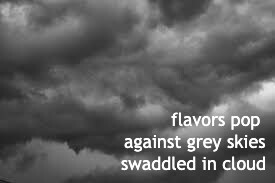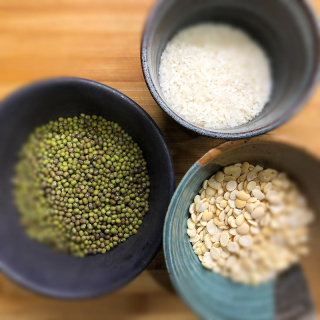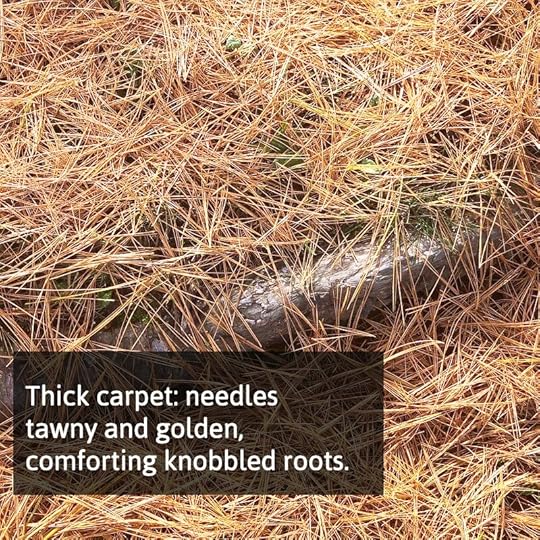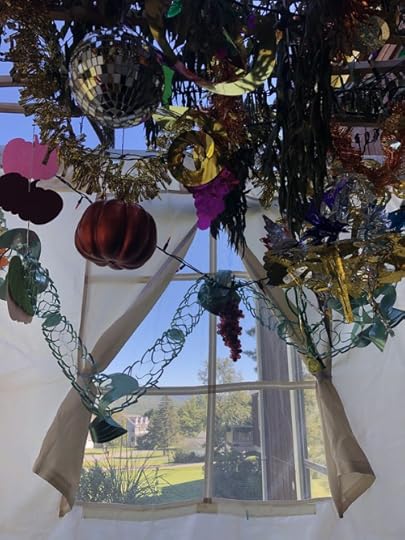Rachel Barenblat's Blog, page 32
October 26, 2021
Rainy day
Last night the rain woke me. I spared a moment to feel grateful for the roof, then went back to sleep. When my alarm sounded the world was swaddled in cloud. I won't relish the time change -- the "fall back" side of the coin -- though I'll be grateful to have more light in the mornings, at least for a while.
I read in Milk Street that in Korea it's traditional to eat pajeon (scallion pancakes) on rainy days. The sound of the batter sizzling in the pan is said to evoke the patter of rainfall. I've never been to Korea, and the prospect of traveling feels implausible now, but look: here's a recipe. Almost like travel.
Two funerals to prepare for, this week. I say this out loud to one of the photos of Mom that I brought back from her house after her funeral. The photo doesn't answer, of course, but thinking of Mom makes me think of clothing, which reminds me that I need to go to the dry cleaner's before Thursday.
You can't go wrong with a black suit, Mom would say. She'd travel with black clothes because they are versatile. One day she'd add her garnet beads, another day a bright scarf. She'd be drinking tea, if she were here. For Mom, cold rainy days were for making soup. Minestrone, maybe, or tortilla soup.
I like to leaf through her recipes, though I don't cook most of them. I brought two tins of Spanish paprika back with me after her funeral, though, and I like cooking with that. It's faded; I should use more of it than recipes call for. But I don't want to use it up. Another tether that I don't want to cut.
October 22, 2021
Soup
Friday means challah dough rising while I work. Today it also means red beans soaking for mashawa, a soup from Afghanistan. Later I'll add quick-cooking yellow lentils, bright like the leaves carpeting the grass outside my kitchen window, and tiny moong beans in dull Army green. I wonder what color camouflage American troops wore in Afghanistan over the last twenty years. I know that trying a recipe from someplace doesn't mean I understand anything about what it's like to live there, or to flee from there, or to yearn for a there that maybe doesn't exist anymore. No matter how many news stories I read, I can't entirely bring the other side of the world into focus. At my work email address, I read and forward another email about resettling refugees. Outside my window the hills are dressed in autumnal tweed. Maple and oak and pine trees rustle. Central Asia couldn't seem further away.
HIAS on how to help Afghan refugees.
Jewish Family Service of Western MA, collecting donations for resettling Afghan refugees here.
Recipes for mashawa: from the Complete Middle Eastern Cookbook, a vegetarian version at Afghan Cooks, another recipe at World Cup of Food.
October 17, 2021
Blanket
October 15, 2021
Go - a d'varling for Lech-Lecha
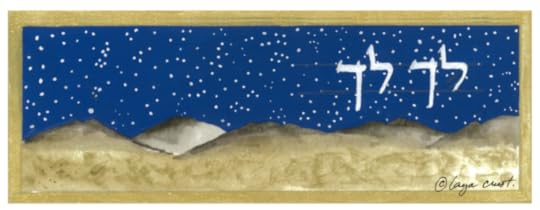
Lech-Lecha: art by Laya Crust.
At the start of this week's Torah portion, God says to Avram,
�������������������� ���������������� ������������������������ �������������������� ���������������������� �������������������������������������� �������������������� ���������������� ������������������������ �������������� ����������������������
Lech-lecha / go forth from your native land and from your father���s house to the land that I will show you. (Gen. 12:1)
�������������������� / Lech-lecha -- can you hear the same sound twice there? That could be translated as "Go, really go!" Or we could translate it as, "Go from yourself," or "Go for yourself." In this verse, God is inviting Avram into a journey. It's a journey of growing up: it's time for him to leave his father's house and become his own person. It's a journey of discovery: figuring out who he is and who he's going to become. It's a literal journey of exploring new territory, and at the same time, an internal journey of becoming.
In this week's Torah portion God and Avram enter into a brit, a covenant -- a sacred agreement. God gives him a new name, Avraham, and promises that his descendants will be as numerous as the stars. God promises to be in relationship with Avraham and his descendants, always. God promises that though Avraham's descendants will go down into Mitzrayim, God will lift us out of that Narrow Place. In return, Avraham gets instructions about mitzvot, commandments. Those are our part of the brit.
Toward the end of this week's Torah portion, God says to Avraham,
������������������������ ���������������� ���������������� ��������������
Walk in My ways and be tamim. (Gen. 17:1)
The word �������������� / tamim can be translated as blameless, or pure, or whole, or perfect. A few verses later God gives the mitzvah of brit milah, so a lot of commentators say that that mitzvah is how we become "perfect." But Rashi (d. 1105) thinks God is saying, "walk in My ways and be wholehearted, even when life is difficult and you feel like I am testing you." And Ramban (d.1270) points out that ���������������� / l'fanai means, "before Me." For him, the verse is God's way of saying, "follow the path that I will show you."
What does it mean to walk in God's ways, or to follow God's path? I think it means listening for that inner voice that says �������������������� / lech-lecha -- go forth, always keep learning and growing, life is a journey. It means choosing a life of mitzvot, and doing our best to follow that path with all our hearts. This is what it means to be a Jew: we're always learning and growing, we're always going forth into something new. The mitzvot are our roadmap, our way of walking, and they're our end of our covenant with God.
These two instructions are like bookends, and here's the other thing I notice this year. At the start of the parsha, God says "Go forth to the place that I will show you." In the beginning, God is showing us the way. God isn't a person who has a body, but it's as though God were walking in front of us. And at the end, God says ������������������������ ���������������� / hithalech l'fanai, "walk before Me" -- now we're taking the lead and God is our backup. God is letting us chart the course, and trusting us to know where and how to go.
This is what a good parent does. First, a good parent shows their child where to go and how to be. Here's the the map, these are the instructions, this is how to keep your spiritual life flowing and how to be an ethical person in the world. And then, as the child matures and becomes ready to make informed choices, it's the parent's job to step back and let their kid lead the way. Not stepping too far back -- still there to offer support or guidance -- but giving the kid an opportunity to make choices and to shine.
This is the d'varling I offered at my shul at Kabbalat Shabbat. (Cross-posted to my From the Rabbi blog.)
October 13, 2021
Tight
I have to be my own Jewish mother
even without a stainless soup pot.
No: I need to be
a better mother to myself --
one who wouldn't say
"put on a happy face!"
Reasons to weep
are as numerous as the stars.
Every bodyworker knows
the muscle that cries out
is the victim: something else
has tightened into immobility.
But when it's the heart
that cries out --
how can I delaminate
years of fused-together sorrows?
October 10, 2021
Stillness
I had hopes of working on a new poem during Shabbat, but my body had other plans. I spent most of Shabbat lying on a heating pad, remembering that when the sciatica flares up, poetry is hard to come by.
The world becomes very immediate. Past and future both recede. I'm firmly in the now of pressing into the heating pad in hopes that spasming muscles and pinched nerve will yield into release.
I remember an on-call shift when I was doing my chaplaincy training some fifteen years ago now. I was having an allergic reaction to a drug I didn't yet know I shouldn't take, and as a result I was unwell.
In those pre-parenthood days, sleep wasn't so precious. I used to stay awake on hospital overnights. They were my opportunity to tend to people, and I didn't want to miss anyone who might need me.
So when my pager buzzed, I would go where it called. And when no one had an emergency need, I would just make my rounds again. Visit the ED again, or one of the ICUs. Someone always needed an ear.
I remember how humbling it was to discover that I couldn't walk the hospital halls in search of people in crisis. Instead I held still on the twin bed in the chaplain's room, praying no one would need me.
I'm thankful that no one needed me yesterday. I'm working on being thankful that my body is reminding me that I need to make time to stretch. This Shabbat was for gentle yoga and for lying very still.
October 2, 2021
From chaos: a d'varling for Shabbat Bereshit
In the beginning, or in a beginning, or as God was beginning to create the heavens and the earth, everything was �������� ���������� / tohu va-vohu / chaos and void, and the breath of God hovered like a mother bird over the face of the waters. And God said ������ ������ / y'hi or / let there be light, and there was light...
Over the summer, my friend and colleague Rabbi Mike Moskowitz pointed out something I had never noticed about this verse. Before creation, there was already �������� ���������� / chaos. The first act of creation, ������ ������ / let there be light is an act of gevurah, differentiating between light and darkness, between one thing and another. But before the beginning, before that act of distinction, chaos already was.
Here we are beginning again. Beginning a new year. Beginning a new Torah reading cycle. And I'm feeling a certain resonance with chaos right now. Maybe you are too.
There's a certain scrambled feeling that comes with making it through the holiday season. We've just gone from Elul to Rosh Hashanah to the Ten Days of Teshuvah to Yom Kippur to Sukkot to Shemini Atzeret / Simchat Torah and whoosh, where did the last six weeks go, what day is it, who am I again? That one happens every year, but that doesn't make it any less real.
There's also a unique scrambled feeling arising for many of us this year in particular. There was the pandemic, obviously, and then last spring as vaccines became available we thought we were coming out on the other side. Now, for reasons I don't need to belabor, it's increasingly clear that we're once again in the thick of it and it is absolutely not over yet. There was the election, and then there was January 6, and then maybe we thought we were coming out on the other side. Now, for reasons I don't need to belabor, it's increasingly clear that we're still in the thick of it and it is absolutely not over yet.
�������� ����������: a mess, empty and upside-down, "in a chaotic state." Does that feel to you like it describes the reality of the last year? Yeah, me too. And we're not alone. My colleague Rabbi Michael Latz, in Minneapolis, calls this last year "immense tohu va-vohu." Not just chaos, but immense chaos. Sounds about right.
How do we begin again from this place?
I think this morning's Torah verses offer a blueprint. Yes, everything is chaos. So what does God do? God draws a boundary. And God speaks light into being.
New beginnings take gevurah. They always have, ever since The Beginning.
What boundary do we need to draw between the chaos that threatens to overwhelm us, and the new beginning that we're called to create? What boundary do we need to draw between ourselves and the relentless bad news and drumbeat of news coverage? (Here's a thought: how can keeping Shabbat help us draw that boundary?) What boundary do we need to draw around behaviors -- our own behaviors that maybe don't serve us well going forward, or the behaviors that we as individuals and as a community deem unacceptable?
Without a boundary, without gevurah, everything is s �������� ���������� / chaos.
And then what light can we speak into being? Every morning we bless God Who speaks the world into being. Our sages point out that we who are made in the Divine image and likeness can also speak worlds into being. Okay, I can't say "let there be coffee" and cause the coffee to manifest in my hand like Janet from The Good Place. But our words shape realities. Our words impact other people. Our words impact our own internal landscape, too. We can choose to use our words to bring light and uplift and hope, or to perpetuate chaos and falsehood and despair.
This week we begin again. The world begins again. Our story begins again. May we begin the new year the way God begins creation: with gevurah, and with words chosen to bring light into dark places and uplift to counter despair. As my friend and colleague R. Mark Asher Goodman writes,
God made meaning out of the chaos -- something beautiful and wonderful -- and we who are created in the image of God can do the same.
Kein yehi ratzon, may it be so.
This is the d'varling I offered at Shabbat morning services at my shul (cross-posted to my From the Rabbi blog.)
October 1, 2021
Beginning
Beginning
created God
heavens and
earth.
Void
and unformed
topsy-turvy
darkness.
That's
us, too:
starting over
uncertain
will
our roads
be rebuilt,
repaired
public
health and
child care
funded
or
will compromise
falter, founder
splinter
like
the chaos
that preceded
creation
when
with beginnings
God created
us?
Beginning / created God. See Genesis 1:1. The opening words of Torah can be rendered as "In the beginning, God created," or "With the quality of beginning, God created," or "In a beginning, God created..." In Hebrew syntax, the words appear in the order beginning, created, God.
Will / our roads / be rebuilt. See Manchin, a key Democratic hold out..., New York Times; Splintered Democrats delay key vote..., Washington Post.
The chaos / that preceded/creation. See Genesis 1:2. Tohu va-vohu can be rendered as "unformed and void," or "wild and waste" -- in a word, the chaos that preceded order.
Write poetry instead of doomscrolling, I said to myself, and this poem is what happened. From the chaos of this political moment, will light emerge?
September 29, 2021
Time
It's time to bring the potted plants indoors.
It's time to find the wooden crate of socks
and figure out which ones are pairs. To use
the bundt pan Mona handed down to me
for apple cake; to look up how I roasted
delicata squash last year. It's time
to pause the New York Times again, to frame
the tweet from Kelli Agodon that says,
"Write poetry instead of doomscrolling."
It's time to take the sukkah down, return
the decorations to their bin, and watch
crabapples reddening across the field.
It's time to place my trust in what endures,
seek sleepy comfort in the growing dark.
Apple cake. Apples and honey are a symbolic food at the Jewish new year. (I'm partial to Deb's mom's apple cake.)
The tweet from Kelli Agodon. See it here.
What endures. See my most recent blog post.
September 26, 2021
What endures
The view from inside my sukkah.
Sitting in my sukkah this year, I've been thinking a lot about what endures. That might seem counterintuitive: after all, a sukkah is the opposite of that. It's temporary structure. Its roof is made from organic matter, casting some shade but also letting in the raindrops and the light of the full harvest moon. A sukkah begins falling apart almost as soon as it is built. And yet...
And yet the sukkah will be rebuilt, next year. And the year after. The practice is perennial. When I sit in my sukkah on my mirpesset, drinking coffee and lifting my etrog to my face to inhale its scent, I remember every year I have ever sat in a sukkah. I think of generations before me who built sukkot. I imagine the generations after me who will do the same.
I like to imagine our descendants figuring out how to observe Sukkot in the stars someday, in the science-fiction future where we emigrate to other planets. What would it be like to build a sukkah on the decks of a starship? To build a sukkah on another planet? How will our relationship to our ancient stories and practices shift in those imagined future generations?
Closer to home, and far more sobering, is the question of how Judaism will adapt to our changing planet as the climate crisis intensifies. How will our practices shift as our planet warms? Sukkot reminds us of the impermanence of our structures, metaphysically and spiritually, but how could I say that to those who have lost their homes to wildfire and hurricane?
One morning in the sukkah this year our conversation veered into American politics. I used to believe that the structures of democracy would protect us from demagogues. I thought it was generally accepted that government's function is to serve everyone, to protect the vulnerable, to ensure and uphold human rights and dignity. That structure feels fragile now.
The American experiment is only a few centuries old -- an eyeblink in the span of human history. It may prove to be temporary. Some argue that it's already over, that our constitutional crisis is already here and democracy as we have known it is already falling to gerrymandering, insurrection, cult of personality, and the terrible persistence of the Big Lie.
I think of the later stories in Ursula K. Le Guin's Orsinian tales, where her fictional European country has become an Eastern Bloc nation. In those stories the government can't be trusted. Privations are the norm. And yet people continue to live and love, even when multiple families share a single apartment, even under surveillance. Isn't that what human beings do?
And that brings me back to the sukkah. Jews have built sukkot in all kinds of circumstances, in all kinds of places, under all kinds of regimes. (We celebrated Sukkot during World War I. We celebrated Sukkot in the Warsaw Ghetto...) Each individual sukkah is temporary and fragile, but the practice endures. The mitzvot, both spiritual and ethical, endure. And so do we.
Last year my Yom Kippur sermon was about our obligation to take care of each other. Whether or not the world is falling down around our ears, our task is to protect the vulnerable, to give aid to those in need, to help each other hope, to build a better world. To feed the hungry. To find housing for the homeless. To raise the next generation to be ethical and kind...
Love endures. Hope endures, even though we have to help each other cultivate it. Our obligations to each other endure -- some even say, from one lifetime to the next. Our spiritual practices endure, no matter what the future holds. And right now, the leaves on the roof of my sukkah are rustling, and I know that Sukkot will come again: the cycles of time endure.
Rachel Barenblat's Blog
- Rachel Barenblat's profile
- 6 followers


